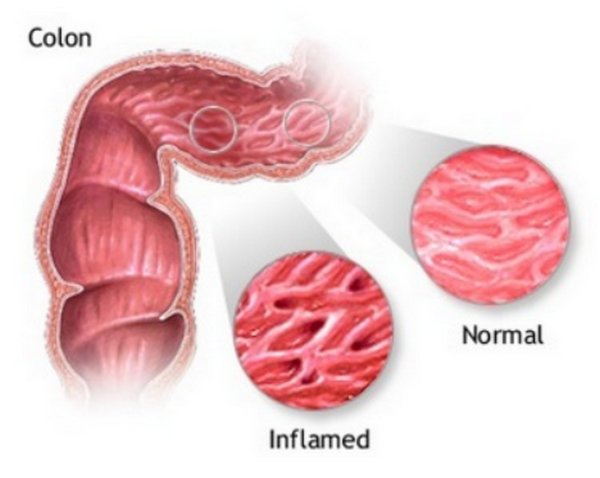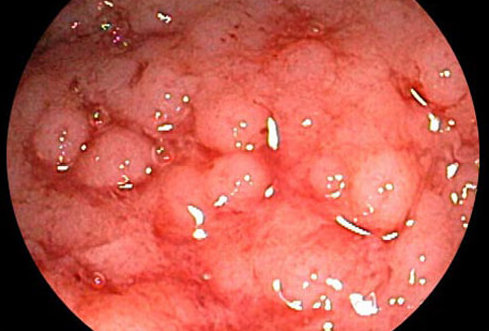Inflamed Colon
Inflammation of the colon is medically known as colitis or inflammatory bowel disease.
Health experts associate the condition to weak immune system, hereditary, and environmental factors. There is no definite cure for inflamed colon. The focus of care is palliative or easing the symptoms of the disease.

Image 1: A view of the colon comparing the normal/healthy colon and the inflamed colon
Picture source: probiotics-help.com

Picture 2: A closed up view of inflamed colon
Photo source: onhealth.com
Signs and Symptoms of Inflamed colon?
- Diarrhea with presence of blood
- Frequent small bowel movement
- Constipation
- Abdominal cramping and pain
- Muscular spasms
- Loss of appetite
- Fever with or without chills
- Iron deficiency
- A feeling of restlessness and tiredness
- Noticeable weight loss
Who are at risk?
Inflamed colon is common to younger people. People living in the Western countries such as the United States and Europe are at risk because of lifestyle such as unhealthy diet and smoking. If your parents or any of your family members have inflamed colon, then it increases your chance of experiencing inflamed colon too. Prolonged used of contraceptive also increases your chance of experiencing inflamed colon.
Diagnostic Procedures
The doctor will request for blood and stool examination along with other diagnostic procedures to confirm the diagnosis. Some of them include the following:
- Colonoscopy – it is an endoscopic procedure that use flexible camera to perfectly view the colon and the surrounding structure. A biopsy or a small sample of tissue will be checked to conform the diagnosis. The patient will be sedated during the procedure.
- Video Capsule Endoscopy – Sometimes the inflammation cannot be viewed using the standard colonoscopy procedure. Hence, a video capsule endoscopy is perform. The patient will swallow a pill-sized camera. The capsule will take a video of the entire small intestines and send the image to the recorder.
- X-ray – Inflamed colon CT scan is also helpful in diagnosing the disease. However, the CT scan alone is not enough. A special x-ray test called small bowel follow through or CT enterography should be performed to find out if the colon and small intestines are inflamed.
Inflamed Colon Diet
Foods to eat
What types of foods you should include in your diet if you are suffering from inflamed colon? Generally, if your colon is inflamed, you have to be very careful with the types of foods you eat. Eat foods that can easily be digested.
- Drink plenty of fluids. If you are suffering from persistent diarrhea, there is a possibility of dehydration. Hence, it is important to keep your body hydrated by drinking a lot of fluids. Water and sports drink are okay as they contain electrolytes like sodium and potassium.
- Increase your intake of probiotics. They facilitate healing of the intestines. Probiotics are good bacteria in the gut. A good source of probiotics includes yogurt and cheese.
- Consume refined grains and soluble fiber to your diet to significantly decrease diarrhea. Foods to include in your diet like peeled fruits and barley.
- When eating fruits and vegetables, make sure you steam them to break down the insoluble fiber. It is easier for your body to digest steamed vegetables like carrots, spinach, and broccoli.
Foods to avoid
To prevent further irritation in the colon, there are certain foods you should avoid eating. As much as possible, you should follow a low residue diet and easily digested foods. It is a must to consume foods from all food groups to meet the daily nutrient requirement of your body. You have to know what types of food you have to avoid for the moment to prevent further inflammation. These are the following:
- Some parts of fruits and vegetables can cause intestinal distress. Avoid eating raw vegetables as they are difficult to digest. Avoid eating cooked greens like kale, corn, and cabbage. Avoid eating dried fruits as they too can be very difficult to digest. Certain fruits should be temporarily eliminated from your diet like berries and pineapple.
- If you are suffering from inflamed colon, you have to avoid whole grains like oatmeal, quinoa, brown rice, nuts, and seeds. Popcorn should be avoided too as it can further irritate the colon.
- If your colon is inflamed, you have to avoid foods containing too much fiber such as nuts, beans, and tough meats. This is to limit bulk in the stool. When cooking the meat, make sure you braise or stew them to make them tender and easy to digest.
- Stay away from caffeinated and carbonated beverages. In fact, you have to avoid alcoholic beverages too. Drink plenty of fluids like water and sports drinks.
- Avoid spicy foods as they can cause irritation of the colon.
How to Treat Inflamed Colon?
There is no exact cure for the disease. The focus of care is to lessen the signs and symptoms and to elicit the inflammation. The common treatment approach is drug therapy, but if deemed necessary, a surgery should be performed. The doctor will prescribe mild medications in the beginning of the drug therapy.
The common drugs used to alleviate the symptoms of inflamed colon include the following:
- Antibiotics – It is used to control and prevent the spread of infection.
- Anti-inflammatory drugs – it is used to prevent further inflammation. Anti-inflammatories are usually in the form of corticosteroids and aminosalicylates.
- Immunosuppressant – This drug retrains the immune response of the body thereby preventing further irritation of the colon.
A surgery will be required, but should only be the last resort. The doctor will thoroughly assess the condition of the patient and will order for surgery when deemed necessary.
Natural Remedies for Swollen colon
- Eat small meals. Try to eat small portion of food for about five to six times a day.
- Take multivitamins because inflamed colon can interfere to the absorption of nutrients in the body. Take multivitamins and minerals. However, before you take any forms of vitamins, you should first consult your doctor.
- It will help a lot if you are going to consult a dietitian. The dietitian can help and guide you on what to do, especially when it comes to proper nourishment.
- You have to avoid smoking as it increases the risk of inflammatory bowel disease. Some studies show that nicotine patch can help in the treatment and management of ulcerative colitis, but the nicotine alone can have harmful effects to the body.
- As much as possible, you should limit your exposure to stressful things. Symptoms of inflamed colon tend to flare during stressful situations. Do your best to manage stress. There are many different ways to deal with stress such as exercise. Simple exercises will not only relieve stress but also relieves depression and regulates normal bowel movement. Another way of managing stress is biofeedback. It focuses on reducing muscle tension and slows down the heart rate. This is to relax the body and help you cope with stress easily. Simple deep breathing exercises can also help your body cope with stress. Yoga and meditation can help too.
The best way to manage inflamed colon is to eat the right foods, avoid foods and situations that can trigger the disease, and live a healthy life. Stick to your diet plan and religiously follow the doctor’s advice. It all boils down to living a healthy life.
References
- https://www.reference.com/health/common-symptoms-inflamed-colon-2422ab64aa111879
- http://www.emedicinehealth.com/colitis/article_em.htm
- http://www.livestrong.com/article/23781-signs-symptoms-inflamed-colon/
- http://www.livestrong.com/article/332659-foods-for-healing-the-colon/
- https://medicalfoxx.com/inflamed-colon.html
- http://www.mayoclinic.org/diseases-conditions/inflammatory-bowel-disease/basics/symptoms/con-20034908
- http://www.webmd.com/ibd-crohns-disease/inflammatory-bowel-syndrome
- http://www.livescience.com/39880-inflammatory-bowel-disease.html
- http://medicalpoint.org/inflamed-colon/
- http://www.tandurust.com/alternativetherapies/inflamed-colon-causes-treatment.html
Published by Dr. Raj MD under Diseases and Conditions.
Article was last reviewed on August 6th, 2018.

